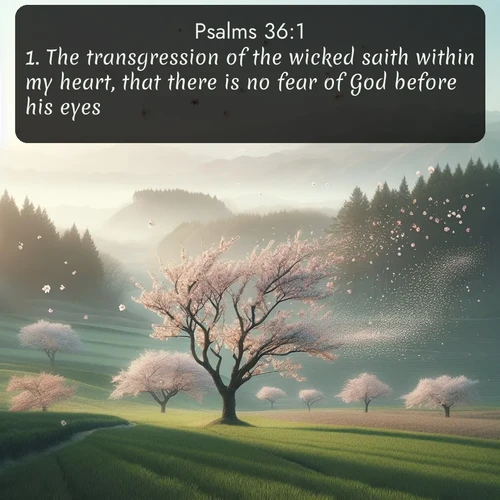Psalms 36:1 plusieurs versions / traductions
English Bible Translations
1. The transgression of the wicked saith within my heart, that there is no fear of God before his eyes.
1. For the Chief Musician. [A Psalm] of David the servant of Jehovah. The transgression of the wicked saith within my heart, There is no fear of God before his eyes.
1. <To the chief music-maker. Of the servant of the Lord. Of David.> The sin of the evil-doer says in his heart, There is no fear of the Lord before his eyes.
1. {To the chief Musician. [A Psalm] of the servant of Jehovah; of David.} The transgression of the wicked uttereth within my heart, There is no fear of God before his eyes.
1. To the chief Musician, A Psalm of David the servant of the LORD. The transgression of the wicked saith within my heart, that there is no fear of God before his eyes.
1. To the Overseer. -- By a servant of Jehovah, by David. The transgression of the wicked Is affirming within my heart, `Fear of God is not before his eyes,
German Bible Translations
1. Ein Psalm Davids, des Knechtes des HERRN, vorzusingen. Es ist aus Grund meines Herzens von der Gottlosen Wesen gesprochen, daß keine Gottesfurcht bei ihnen ist.
1. Dem Vorsänger. Von David, dem Knecht des HERRN. (H36-2) Ein Urteil über die Sünde des Gottlosen kommt aus der Tiefe meines Herzens: Die Gottesfurcht gilt nichts vor seinen Augen!
French Bible Translations
1. Au chef des chantres. Du serviteur de l'Eternel, de David. La parole impie du méchant est au fond de son coeur; La crainte de Dieu n'est pas devant ses yeux.
1. La transgression du méchant dit, au dedans de mon coeur, qu'il n'y a point de crainte de Dieu devant ses yeux.
1. Psaume de David, serviteur de l'Eternel, [donné] au maître chantre. La transgression du méchant me dit au-dedans du cœur, qu'il n'y a point de crainte de Dieu devant ses yeux.
Versions with Strong Codes
Psalms 36 / KJV_Strong1.
Strong Code definitions
H5329 natsach naw-tsakh' a primitive root; properly, to glitter from afar, i.e. to be eminent (as a superintendent, especially of the Temple services and its music); also (as denominative from H5331), to be permanent:--excel, chief musician (singer), oversee(-r), set forward.see H5331
H1732 David daw-veed' rarely (fully); Daviyd {daw-veed'}; from the same as H1730; loving; David, the youngest son of Jesse:--David.see H1730
H5650 `ebed eh'-bed from H5647; a servant:--X bondage, bondman, (bond-)servant, (man-)servant.see H5647
H3068 Yhovah yeh-ho-vaw' from H1961; (the) self-Existent or Eternal; Jehovah, Jewish national name of God:--Jehovah, the Lord. Compare 3050, 3069. see H3050 see H3069
H6588 pesha` peh'-shah from H6586; a revolt (national, moral or religious):--rebellion, sin, transgression, trespass. see H6586
H7563 rasha` raw-shaw' from H7561; morally wrong; concretely, an (actively) bad person:--+ condemned, guilty, ungodly, wicked (man), that did wrong.see H7561
H5002 n'um neh-oom' from H5001; an oracle:--(hath) said, saith. see H5001
H7130 qereb keh'-reb from H7126; properly, the nearest part, i.e. the center, whether literal, figurative or adverbial (especially with preposition):--X among, X before, bowels, X unto charge, + eat (up), X heart, X him, X in, inward (X -ly, part, -s, thought), midst, + out of, purtenance, X therein, X through, X within self.see H7126
H3820 leb labe a form of H3824; the heart; also used (figuratively) very widely for the feelings, the will and even the intellect; likewise for the centre of anything:--+ care for, comfortably, consent, X considered, courag(-eous), friend(-ly), ((broken-), (hard-), (merry-), (stiff-), (stout-), double) heart((-ed)), X heed, X I, kindly, midst, mind(-ed), X regard((-ed)), X themselves, X unawares, understanding, X well, willingly, wisdom.see H3824
H369 'ayin ah'-yin as if from a primitive root meaning to be nothing or not exist; a non-entity; generally used as a negative particle:--else, except, fail, (father-)less, be gone,in(-curable), neither, never, no (where), none, nor, (any, thing), not, nothing, to nought, past, un(-searchable), well-nigh, without. Compare 370.see H370
H6343 pachad pakh'-ad from H6342; a (sudden) alarm (properly, the object feared, by implication, the feeling):--dread(-ful), fear, (thing) great (fear, -ly feared), terror.see H6342
H430 'elohiym el-o-heem' plural of H433; gods in the ordinary sense; but specifically used (in the plural thus, especially with the article) of the supreme God; occasionally applied by way of deference to magistrates; and sometimes as a superlative:--angels, X exceeding, God (gods)(-dess, -ly), X (very) great, judges, X mighty.see H433
H5048 neged neh'-ghed from H5046; a front, i.e. part opposite; specifically a counterpart, or mate; usually (adverbial, especially with preposition) over against or before:--about, (over) against, X aloof, X far (off), X from, over, presence, X other side, sight, X to view.see H5046
H5869 `ayin ah'-yin probably a primitive word; an eye (literally or figuratively); by analogy, a fountain (as the eye of the landscape):--affliction, outward appearance, + before, + think best, colour, conceit, + be content, countenance, + displease, eye((-brow), (-d), -sight), face, + favour, fountain, furrow (from the margin), X him, + humble, knowledge, look, (+ well), X me, open(-ly), + (not) please, presence, + regard, resemblance, sight, X thee, X them, + think, X us, well, X you(-rselves).
Prédications qui analysent les thèmes Psaumes 36
Thèmes : La bonté de Dieu; Prière pour la délivranceRelated Sermons discussing Psalms 36
Themes : La bonté de Dieu; Prière pour la délivrancesee also: Bible Key Verses ; KJV Bible Images, BBE Bible images

